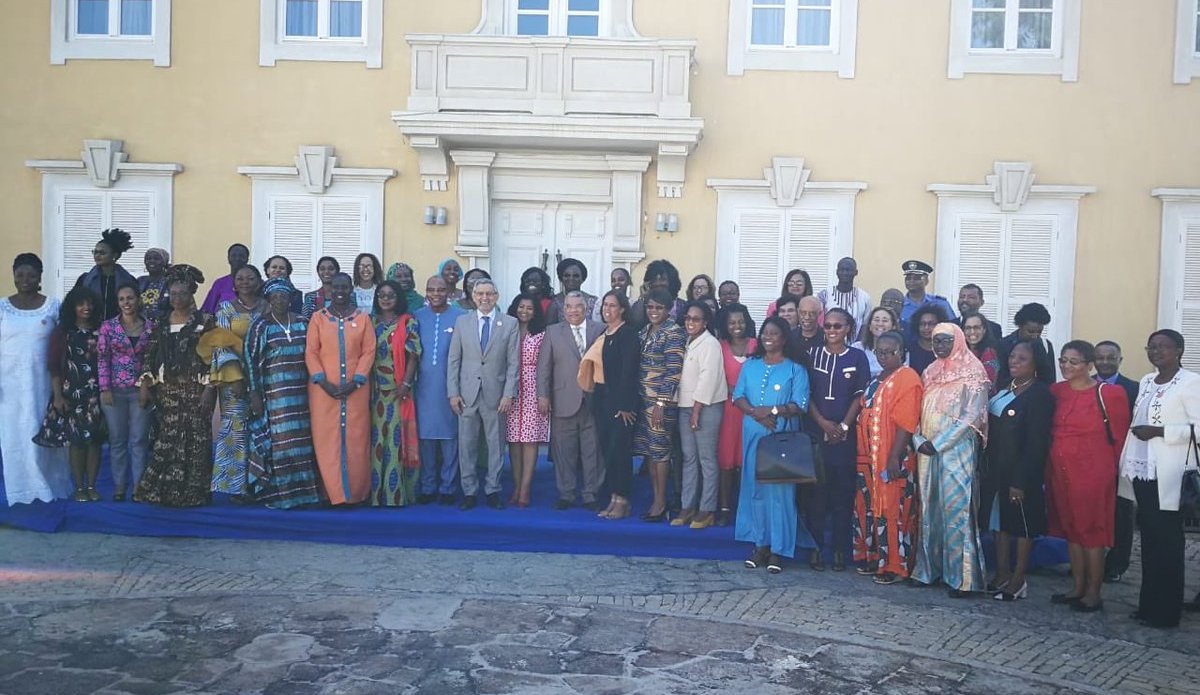WOMEN AND YOUTHS OF WEST AFRICA AND THE SAHEL ASK FOR A GREATER PARTICIPATION IN ALL DECISION-MAKING PROCESSES
Praia, Cabo-Verde, 26 November 2018- The President of the Republic of Cabo Verde, Mr. Jorge Carlos Fonseca and the Special Representative of the Secretary-General and Head of the United Nations Office for West Africa and the Sahel (UNOWAS), Mr. Mohamed Ibn Chambas, co-chaired today 26 November 2108, in Praia, Cabo Verde, the ninth Edition of the Regional Open Day on United Nations Security Council Resolutions 1325 (2000) and subsequent on Gender, Women, Youth, Peace and Security.
More than 100 women and young leaders from West Africa and the Sahel, including those from rural areas as well as actors from civil society organizations, academics, representatives of regional organizations, and United Nations entities participated in this ninth edition of the Open Day in the presence of the First Lady of Cabo Verde, Mrs. Ligia Lobrano Dias; the Deputy Minister for Regional Integration, Mr. Júlio Herbert; the Minister for the Promotion of Women and Gender of the Republic of Ghana, Mrs. Morrison Cynthia; the United Nations Resident Coordinator, Mrs. Ana Patricia Garca; the UN Women Regional Director, Ms. Diana Ofwana; representatives of regional organizations, members of the diplomatic corps accredited to Cabo Verde, as well as technical partners.
The objective of the 2018 edition was to discuss the challenges that hinder the promotion of the role of women and youth, and to define effective strategies for a greater involvement of women and youth in all decision-making processes.
Hosting this Open Day at the Presidential Palace, the President of the Republic of Cabo Verde, Mr. Jorge Carlos Fonseca said that “gender, women, youth, peace and security are at the heart of development”. “It will not be possible to find solutions to the complex problems of peace and stability in Africa without seeking the participation of young people and women,” he added.
For his part, the Special Representative of the United Nations Secretary-general for West Africa and the Sahel, Mohamed Ibn Chambas, recalled the importance of directing actions for a concrete impact: « to back our actions with the requisite financial and political support, allow more efficient, effective and integrated ways of conducting mediation, give more space to the participation of women and youth and provide adequate funds to women’s organizations and gender expertise within the region ».
Taking stock of the involvement of women in the region in political decision-making and mediation processes, UN Women Regional Director Diana Ofwona emphasized that "23 years after the establishment of the 30% target, the representation of women is only 15% in the elected assemblies and 17% in the governments of our region. Around the world, women represent 23% of parliaments, 6% of heads of state and 5% of heads of government »
The discussions underlined that although women and youth in West Africa and the Sahel are the majority voters and electors in most countries, their political participation, especially in elective or nominative political parties, remains very low compared to many countries in other parts of the world.
In its presentation on the comparative study produced this year by the Working Group Women, Youth, Peace and Security in West Africa and the Sahel and whose main conclusions and recommendations were shared with the participants, the President of the Network for Peace and Women's Security in the ECOWAS region, Ms. Diago Ndiaye, noted that in the ten countries covered by the study, women and young people are generally confined to the role of mobilization within their political party.
Several countries have adopted a parity or quota law dedicated to women's participation. However, the rigorous application of these laws, especially in a context of lack of enforcement provisions, in addition to the non-dissuasive and non-binding nature of these laws, remains a major challenge. Indeed, research shows that even in countries where there is a law on parity for elective and semi-elective bodies, the rate of their presence does not reach 50%. The situation is more worrying in nominative proceedings, where no provision compels the executive and the legislature to appoint them.
In closing this ninth edition, the Minister of State for Sport and Relations with the Parliament of Cabo Verde, Mr. Fernando Elisio Freire renewed his country's commitment to strengthen the participation of women and youth in all processes of decision-making. "We are determined to adopt the law on parity in Cabo Verde," he said.
Organized since 2010 by UNOWAS, in partnership with the Economic Community of West African States (ECOWAS), the G5 Sahel and the Mano River Union (UFM), the Regional Open Days are an platform of discussion where women and youth leaders can interact with senior United Nations and regional organizations on their experiences, concerns and priorities in the implementation of the United Nations Security Council Resolutions 1325 (2000) and subsequent on Gender, Women, Youth, Peace and Security.
###
 UN
UN


